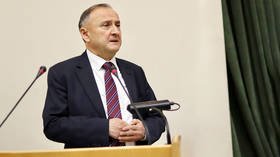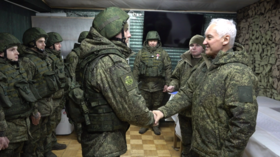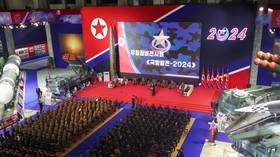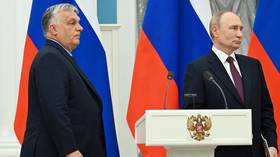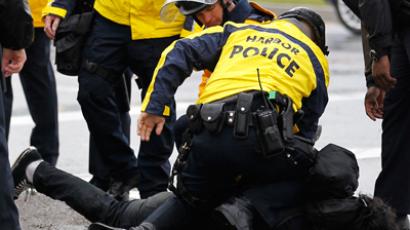‘Democracy cannot be brought about from the outside’
The future of human rights and democracy in the volatile, post-Arab Spring Middle East is still murky, with daily violence continuing to threaten the lives of civilians. RT discussed the situation with Russian human rights envoy Konstantin Dolgov.
RT: The Arab Spring has upset the balance of power in North Africa and the Middle East. We witnessed politically Islamic movements come to power across the region. Some are moderate, but the rise of radical Islamism is evident. What threats do these radicals represent?Konstantin Dolgov: First of all, the so-called Arab Spring is a process which totally reflects certain objective phenomena in the region. It was a movement that came from within. Obviously, there was certain external participation and prodding. Stability is basically kept in cases, in which the change came from within, and we face fewer immediate threats as far as extremism and the security of those countries and the adjacent region is concerned. It is definitely different when certain transformations and political changes are being pushed from the outside. Then it’s a different picture. We keep reiterating, and it is not only Russia’s view, that you cannot bring about democracy from the outside. Democracy is to become the result of certain internal processes.If we take the situation which falls within my purview, my mandate, the situation within the field of human rights and democratic development and rule of law, the picture is not black and white, and we cannot say that human rights are being better ensured in certain countries of the region where the Arab Spring has occurred. It’s still a long way off.RT: Let’s take Libya. Are human rights ensured at all? Or were they better off before the NATO-led invasion?KD: The new post-Gaddafi government of Libya expressed its willingness to build a democratic Libya, to build a Libya that will adhere to basic human rights and democratic freedoms, which is positive. And the picture is pretty much mixed. Unfortunately, what we see now is that violations of human rights do continue. In a way, it’s a result of last year’s military conflict. But still, the future is ahead for this country. We hope that this future will be democratic. We hope that human rights will be ensured in their entirety for both Libyans and the citizens of other countries. RT: What’s going on with the two Russian men who are serving their sentence in Libya?KD: I’m not a lawyer, and I’m not sure whether the phrase ‘serving their sentence’ is absolutely right. They have been sentenced, one of them to life in prison, and another one to ten years in prison, and we have expressed our assessment of the sentences. We think they are too harsh, that they absolutely do not deserve such punishment. We think that the legal processes and the lawsuits were faulted and flawed. The situation is that the lawyers and the Russian side have appealed. We hope that the sentences will be reviewed. We strongly encourage the Libyan authorities to provide for all basic rights of our citizens, in accordance with the international standards. Our main goal remains to bring our citizens back home. RT: Viktor Bout is an example of what his defendants say is a criminal case invented by the United States. Viktor Bout is a Russian businessman who was kidnapped by the US Drug Enforcement Administration and sentenced to 25 years in prison to serve in the United States. Russia’s Foreign Ministry has said many times that it will try to restore justice. What is going to happen there?KD: It’s the same goal. We are undertaking all the necessary efforts to bring our citizen back home. Indeed, we think that the sentence is unjust. We think that the entire process that led to that sentence was absolutely political, from beginning to end. The goal remains the same. We keep raising the issue of Mr. Bout. There a number of other similar cases such as the case of Mr. Yaroshenko, also a Russian citizen, who has also been extradited to the United States, and he also has been sentenced to 20 years in prison. RT:What do you by saying that the Bout case was political?KD: There is a lot ofHollywood-ism in the story of Mr. Bout. I don’t only mean that famous movie Lord of War, which unfortunately also became a factor in the lawsuit, but the fact that he was sentenced for intentions to commit something illegal in the eyes of the American system of justice. What we’ve seen is a lack of an objective and impartial legalistic approach. One more issue is that we keep pushing American authorities to ensure humane conditions for our citizens in prison. It is not good when Russian citizens in American prisons are being deprived of medical assistance. And unfortunately, we had to raise this issue more than once with Americans vis-à-vis both Mr. Bout and Mr. Yaroshenko. Bout is still in one of the federal prisons, and he is in a special cell for the most dangerous criminals. He definitely does not represent a clear danger to the security of the United States, in his present state in particular. RT: President Obama promised to close down Guantanamo Bay. One Russian citizen is also serving his sentence in that prison. Obama hasn’t been able to do this so far. Do you think it would be easier for him to accomplish that if he’s re-elected?KD: I don’t want to speculate about the upcoming American elections. It’s definitely the will of the American people. But this particular problem is gaping in the human rights domain because that particular prison is very special institution. No norms of international law and international humanitarian law are respected there. It’s like a legal vacuum. It is not only our view. The issue is to be tackled, whether it will be tackled by the incumbent administration, and some people say the chances are slim, or it will be tackled by the next administration, whatever it will be. It needs to be tackled because this issue is an unresolved human rights problem. RT:Syria is in the news lately. If we observed what happened and how things happened in countries like Egypt, Tunisia, Libya, all those Arab countries that underwent revolutions. What lessons are there to be learned for the Syrian scenario?KD: I will stick to the humanitarian field. The main lesson is the following. The best way to prevent new casualties amongst the civilian population, the best way to ensure respect for human rights and dignity in a long-term manner is definitely to stop hostilities as soon as possible, and to begin a full-fledged national political dialog encompassing all constructive political forces in the country. And definitely, this has to happen without external political interference. Civilians are the first to suffer. We saw that in Libya where quite a number of civilians perished, some of them under the NATO strikes, a fact that still has to be investigated.



